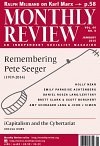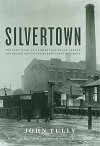England
There is a concept in biology called “punctuated equilibrium”: organisms can display little discernible change over long periods of time before sudden, sharp, and profound changes. Without wishing to give credence to teleological or determinist views, it does seem that human history is profoundly dialectical. Sharp change that bewilders an apologist for the status quo can inspire and give hope to those of us who believe that a better world is possible. We live in interesting but depressing times today. Neoliberal ideas are hegemonic. The old collectivist values of the labor movement have been submerged in a tide of market fundamentalism, summed up in Margaret Thatcher’s claim that “there is no such thing as society; there are only individuals and families.” When I began researching for my Silvertown book, it became apparent to me that a similar flood tide of liberalism had washed over much of nineteenth-century Britain. This portrayed the status quo as normal, natural, and inevitable, but the equilibrium was punctuated in the last decades of the century. | more…

In early 1917, as Britain was bogged down in a war it feared would never end, Alice Wheeldon, her two daughters, and her son were brought to trial and imprisoned for plotting the assassination of Prime Minister Lloyd George, who they believed had betrayed the suffrage movement. In this highly evocative and haunting play, British historian and feminist Sheila Rowbotham illuminates the lives and struggles of those who opposed the war. The Wheeldons’ controversial trial became something of a cause célèbre—a show trial at the height of the First World War—based on fabricated evidence from a criminally insane fantasist, “Alex Gordon,” who was working for an undercover intelligence agency. It was a travesty of justice. Friends of Alice Wheeldon is combined here with Rowbotham’s extended essay, “Rebel Networks in the First World War,” that gives a historical overview of the political and social forces that converged upon the Wheeldon family and friends. | more…

The publication of socialist books in the United States has always encountered serious institutional obstacles. This can be seen in the enormous hurdles that stood in the way of the successful publication 130 years ago of the English translation of Engels’s The Condition of the Working Class in England (1845)—today recognized as the classic account of the impact of the Industrial Revolution on workers. In 1885 Florence Kelley (-Wischnewetzky), the daughter of William D. Kelley, a U.S. Congressman and supporter of Lincoln, translated Engels’s book into English. Her initial plan was to publish the translation in the United States with the respected publishing firm of G.P. Putnam & Co. However, Putnam declined to publish it on the grounds that the book was outdated…and did not apply to U.S. industrialization, where such conditions of class exploitation were supposedly absent.… It is owing to these difficulties, associated with the U.S. publication of his book, that we have the benefit of some of Engels’s more important comments regarding the problem of publishing socialist works in a capitalist society. | more…
Cal Winslow, ed., E.P. Thompson and the Making of the New Left: Essays & Polemics (New York: Monthly Review Press, 2014), 333 pages, $23.00, paperback.
It is surely difficult for young people today to grasp that thirty years or so ago, radical historian-activist Edward Thompson was by opinion polls intermittently the second or third most popular person in England, just after the Queen Mother. This was despite the British establishment, to say nothing of U.S. Cold Warriors (liberal or conservative), slandering him for decades—and why not? He had led massive protest movements of ordinary people against their government. Worse, in cloistered academic quarters he was viewed as having reorganized the whole idea of social history and turned it over to ordinary people! More than anyone else in the English-speaking world, he made the history of such people important. | more…

In 1889, Samuel Winkworth Silver's rubber and electrical factory was the site of a massive worker revolt that upended the London industrial district which bore his name: Silvertown. Once referred to as the “Abyss” by Jack London, Silvertown was notorious for oppressive working conditions and the relentless grind of production suffered by its largely unorganized, unskilled workers. These workers, fed-up with their lot and long ignored by traditional craft unions, aligned themselves with the socialist-led “New Unionism” movement. Their ensuing strike paralyzed Silvertown for three months. Historian and novelist John Tully tells the story of the Silvertown strike in vivid prose. He rescues the uprising—overshadowed by other strikes during this period—from relative obscurity and argues for its significance to both the labor and socialist movements. | more…


